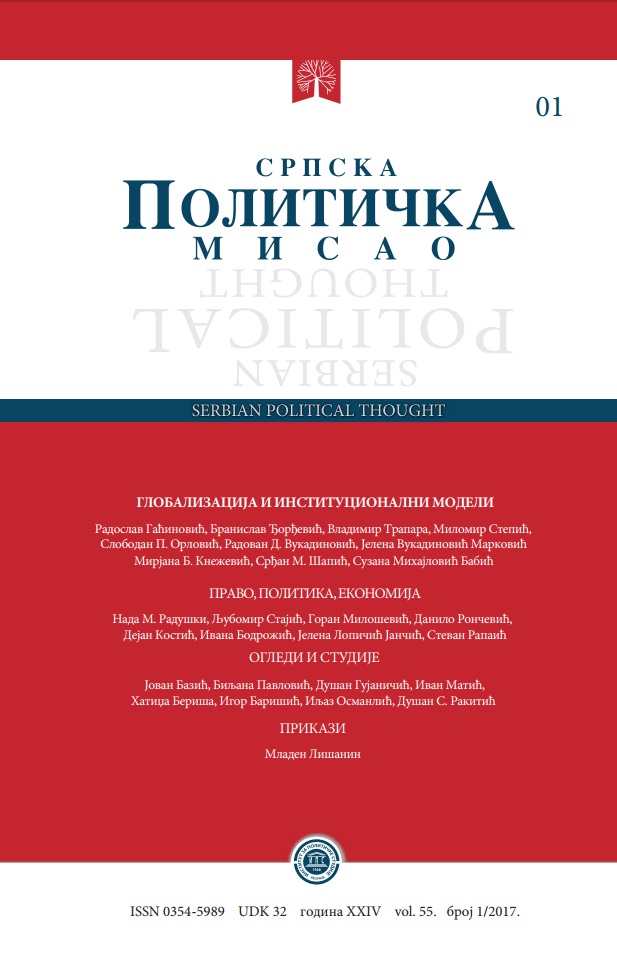Улога музике у формирању и реконструкцијама српског националног идентитета
Music Role in Establishing and Reconstruction of Serbian National Identity
Author(s): Jovan R. Bazić, Biljana PavlovićSubject(s): Cultural history, Music, Social history, Recent History (1900 till today), 19th Century, Politics and Identity
Published by: Институт за политичке студије
Keywords: Serbian identity; Yugoslavhood; music; patriotism
Summary/Abstract: The long-term socio-historical processes of feeling uniqueness and belonging to ethnic, cultural and political communities formed the Serbian identity. National consciousness, associated with Nemanja and St. Sava and centered on memories of the existence and glory of Serbian medieval state, is the key factor of Serbian identity. They won the autocephalous Serbian Orthodox Church and laid the foundations of Serbian statehood after the Byzantine model. Very important role in formation of Serbian identity played music. It has been an integral part of religious rituals, state and court ceremonies, military campaigns and the winning ceremony, celebration and folk joy. In those events, the music directly contributed to the development of patriotic feelings and combat morale. The Turkish authorities have prevented the maintenance of religious rituals, folk customs and celebrations during centuries of slavery under their rule. However, behind its walls, churches and monasteries continued to be places where the people could choir hymns as well as in their homes, were people secretly sang and played, nursed their customs, thanks to which managed to preserve their culture and national consciousness. From the First Serbian Uprising (1804), the music was more present in people but also among the rebels. At the same time, besides the process of liberation from the Ottoman Empire and the creation of the modern Serbian state, the Serbian people carried out a major cultural and educational revival. Inspired by Serbian folklore, church music and national history music was even more artistically shaped in the works of many composers. Music strongly urged patriotic feelings, which is especially evident at the time of liberation wars (1912-1918). Thosesongs, by their defiant, libertarian, patriotic and humanistic spirit powerfully lifted the moral conscience of the people, strengthened the fighting spirit and unity and encouraged fight for freedom. Serbian music has evolved largely spontaneously its basic characteristics, in addition to artistic and aesthetic nature, the authenticity, peculiarity and originality until the creation of Yugoslavia. Later, the development of music was increasingly directed by cultural policy and it was a very important instrument in the process of reconstruction of national identity. During the twentieth century Serbian identity went through three waves of reconstruction, which were determined by national interests, ideological, political and national reasons: 1) blending of Serbian identity into the Yugoslav; 2) the transformation of the Yugoslav identity through politics of brotherhood and unity; and 3) as Yugoslavia disintegrated return to Serbianhood. According to the new system of values and the prevailing ideological and political convictions, music creativity was favored in these processes. By doing this and favoring Yugoslav, cosmopolitan, revolutionary and other elements that have formed new music and celebrated musical life in Yugoslavia, national music has been increasingly suppressed. Such music directly contributed to the development of the Yugoslav consciousness, strengthening unity and tied the people through new ideological constructs. The renaissance of the Serbian national music took place at the time of leaving the Yugoslav and renewal of Serbian identity, especially in awakening national consciousness and developing national feelings. The music had a very important role in the formation of Serbian national identity as well as its reconstruction. On the other hand, the Serbian identity was grounded in authentic music, which through its evolution had multiple functions and was an integral factor in the system of values of Serbian society.
Journal: Српска политичка мисао
- Issue Year: 2017
- Issue No: 1
- Page Range: 279-298
- Page Count: 20
- Language: Serbian

